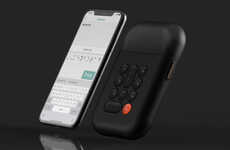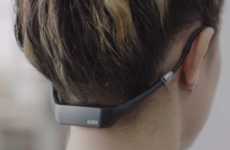
'Team Tactile' Has Created a Device for Translating Text to Braille
References: smithsonianmag & digitaltrends
Team Tactile, a research group from MIT, has developed a device that can do what many apps and AI systems have been able to handle for years. The handheld gadget is capable of translating one written language to another in real time -- indeed, something that Google Translate and other similar services have boasted for some time now. What separates Team Tactile's tech are the languages in question: the device translates written text into Braille.
Team Tactile's Braille translator is about the size of a candy bar. When running the device over any written text, its top surface will raise dimples that display six Braille characters at a time. Such a system can allow blind people to access any text that they come upon in the real world, not just text that already has an embedded Braille translation.
Team Tactile's Braille translator is about the size of a candy bar. When running the device over any written text, its top surface will raise dimples that display six Braille characters at a time. Such a system can allow blind people to access any text that they come upon in the real world, not just text that already has an embedded Braille translation.
Trend Themes
1. Real-time Language Translation - The development of real-time language translation devices creates opportunities for seamless communication across different languages and cultures.
2. Accessible Technology - Advancements in tactile technology, like Team Tactile's Braille translator, open up new possibilities for creating inclusive and accessible solutions for the visually impaired.
3. Alternative Interface Solutions - The emergence of devices that translate text into Braille highlights the potential for alternative interface solutions that cater to diverse user needs.
Industry Implications
1. Language Translation and Interpretation - The language translation and interpretation industry can utilize real-time translation devices to enhance multilingual communication in various sectors, including tourism, hospitality, and international business.
2. Assistive Technology - The field of assistive technology can benefit from developments in tactile devices, offering innovative solutions for individuals with visual impairments in education, employment, and daily life activities.
3. Information Accessibility - The information accessibility industry can explore the integration of alternative interface solutions, like Braille translators, to make digital and print information more accessible to people with visual disabilities.
2.7
Score
Popularity
Activity
Freshness























